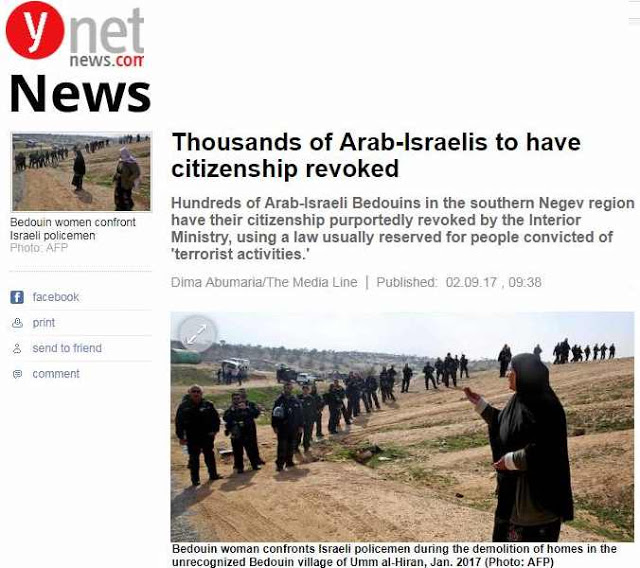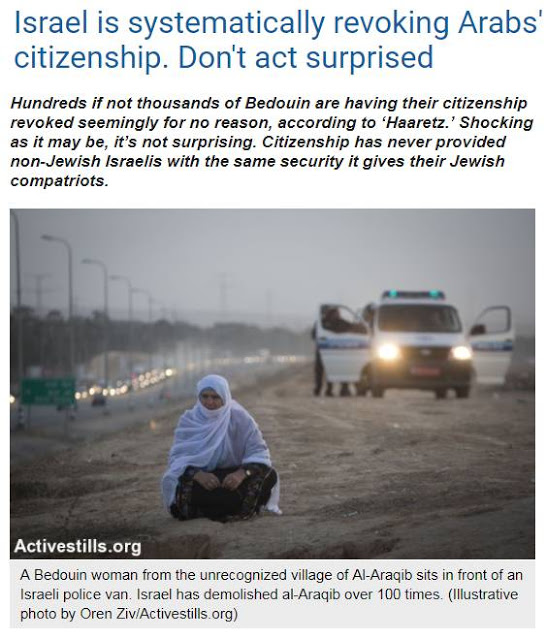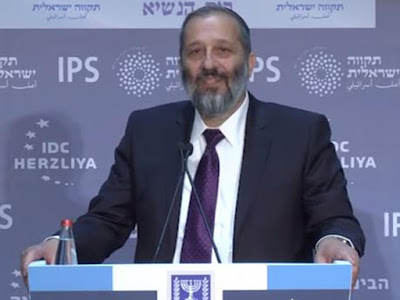Because
Israel is an Apartheid state Jews could
not lose their citizenship ‘by mistake’
Israel is an Apartheid state Jews could
not lose their citizenship ‘by mistake’
Israel is engaging on a plan to ‘Judaify’
the Negev desert area in the south. It
is sparsely populated and most of its inhabitants are Bedouin. Thousands of them were expelled into
neighbouring countries from 1948 until the mid 1950’s and those who remain live
in ‘unrecognised’ villages. That means
they have no mains water, electricity, state schools, sewerage etc. It also means that they are liable to be demolished
at a moments notice.
over a hundred times and in January Umm al-Hiran was demolished. One protestor, a school teacher, was murdered
by the Police who fired rubber bullets at the leader of the Joint Jewish-Arab
list in the Knesset, Aymen Odeh, injuring him.
al-Hiran was to build a Jewish town, Hiran, in its place. In other words naked Apartheid.
thousands of Bedouin are having their Israeli citizenship revoked at a stroke
of a bureaucrat’s pen. The reason given
is that they were registered as citizens by mistake. They have lived in what is now Israel all
their lives. They are the indigenous
population, unlike the Jewish settlers who came mostly after them, but that
doesn’t count. It as all a mistake and
so they are no longer citizens. In fact
they never were citizens!
to a Jew because if you are Jewish you have the automatic right under the
misnamed Law of Return to go to Israel and claim citizenship. If I were to go to Israel and claim
citizenship I would have to be granted it even though I have never lived
there. Arabs who have lived in Israel for
hundreds of years can have their citizenship revoked immediately. This is not accidental. It is the product of a Jewish state where
Arabs live in it by sufferance only. In Jerusalem
thousands of Arabs who had permanent residency cards are now having them
revoked too.
people in the West still see Israel as a democratic state.
By Michael
Schaeffer Omer-Man |Published
August 26, 2017
thousands of Bedouin are having their citizenship revoked seemingly for no
reason, according to ‘Haaretz.’ Shocking as it may be, it’s not surprising.
Citizenship has never provided non-Jewish Israelis with the same security it
gives their Jewish compatriots.
village of Al-Araqib sits in front of an Israeli police van. Israel has
demolished al-Araqib over 100 times. (Illustrative photo by Oren
Ziv/Activestills.org)
after a few minutes of pattering on a keyboard without looking up to see the
human being in front of him or her, a government clerk informs you that you are
no longer a citizen of the only country you have ever known. The country of
your birth.
calmly explains. It’s not like that. You were never a citizen in the first
place, you see, it was all a mistake — never mind the fact that you were
born in Israel to parents who are Israeli citizens, and your siblings are
Israeli citizens, and maybe you even served in the Israeli army.
Bedouin
terrifying experience in recent years, according to a report by Jack Khoury in Haaretz Friday.
Israelis are exempt, is part of a policy in which one’s citizenship is
re-adjudicated, without a judge or judicial process of course, every time one
comes into contact with an Interior Ministry clerk for the most routine
reasons, according to the Haaretz investigation.
those of us lucky enough to be citizens of a country, so much of our security
in this world comes bundled up with it. Of course, Palestinians and other
non-Jews have never had the same level of security attached to their
citizenship in Israel as their Jewish compatriots do. Many of them, like the
hundreds of thousands of Palestinians from East Jerusalem, don’t even have citizenship to
begin with.
declared his belief that some, namely Arab, Israeli citizens
should be stripped of their citizenship for making political statements not to
his liking. A senior government minister recently threatened a “third Nakba,”
referencing the largely forced displacement of 700,000 Palestinians in 1948.
And then there was the landmark ruling earlier this month actually stripping
a Palestinian-Arab man of his
Israeli citizenship because of his familial lineage. Let us not
forget the more-than 14,000 Palestinian
residents of East Jerusalem who have had their permanent residency
status stripped of them over the years, sending them into exile.
Israel is not a state of all its citizens
— any minister in the current Israeli government would be happy to tell you as
much. Advocating turning Israel into a state with those types of
liberal-democratic building blocks is considered nothing short of seditious.
It is antithetical to Zionism as it has come to be defined in the contemporary
Israeli zeitgeist.
citizens are taking place in the Negev desert, where every Israeli government
has tirelessly worked to establish Jewish hegemony in the sprawling desert that
comprises more than half of Israel’s land mass. The latest iteration of those
plans, The Prawer Plan,
which sought to displace some 40,000 Bedouin citizens living in dozens of “unrecognized” villages,
was just one in 70 years of similar efforts. Currently, the Israeli government
is finalizing the destruction of the Bedouin village of Umm al-Hiran in order
to build a new settlement in its place — for Jews only.
strategic threat; one out of every five Israeli citizens do.
sees some of its citizens as assets and others as liabilities, which bestows
inalienable rights upon some and views others as expendable — is not a just
state. After 70 years, the question is no longer whether Israel can balance its
Jewish and democratic character. The question is which of them it has chosen.
is scheduled to advance the
“Jewish Nation-State” law in
the coming weeks. The government-supported bill, which is the equivalent of a
constitutional amendment in Israel’s system, would explicitly favor the
country’s Jewish character over its democratic character.
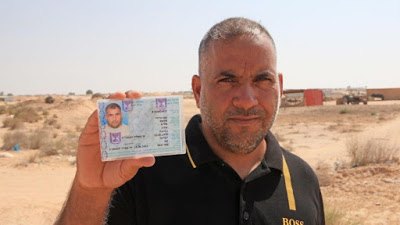 |
| Abu Gardud Salem from the village of Bir Hadaj of the Azzamah tribe on August 18 became a man without citizenship after a trip to Israeli immigration offices. |
in the unrecognized village of Bir Hadaj. Some hold documents in plastic bags
while others clutch tattered envelopes. What brought them to this village south
of Be’er Sheva in Israel’s Negev desert was that the Population, Immigration
and Border Authority had revoked their citizenship, claiming that it had been
awarded to them in error.
months, this appears to be a widespread phenomenon among the Negev’s Bedouin
residents. Hundreds if not thousands of them are losing their citizenship due
to “erroneous registration.” This is the reason they get from the Interior
Ministry, with no further details or explanation.
trying to obtain Israeli citizenship for years. He doesn’t understand why
Israel won’t grant it to him; his father served in the Israel Defense Forces.
“Sometimes they say there was a mistake in my parents’ registration dozens of
years ago. Is that our fault?” asks al-Dantiri. He’s not the only one, but many
of those who came to the meeting were reluctant to identify themselves out of
concern that it might hurt them in their interactions with the Population
Authority. Others have already given up hope.
carpenter who has been unemployed for a year following a road accident. He has
12 children from two wives. One is an Israeli citizen and the other comes from
the West Bank. Seven of his children have Israeli citizenship but he has been
stateless since 2000. “I went to the Interior Ministry to renew my identity
card,” he relates. “There, without any warning, they told me they were
rescinding my citizenship since there was some mistake. They didn’t tell me
what it was or what this meant. Since then I’ve applied 10 times, getting 10
rejections, each time on a different pretext. I have two children who are over
18 and they too have no citizenship. That’s unacceptable. I’ve been living in
this area for dozens of years and my father was here before me. If there was a
mistake, they should fix it.”
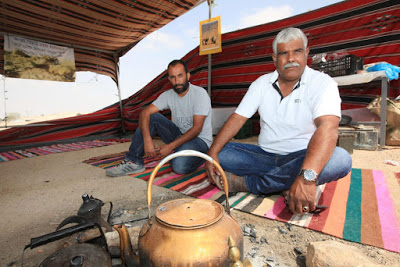 |
| Salim al-Dantiri from Bir Hadaj Eliyahu Hershkovitz |
“many of these people, mainly ones who don’t speak Hebrew that well, don’t
understand what happened to them. No one explains anything and all of a sudden
your status changes. You go in as a citizen and come out deprived of
citizenship, and then an endless process of foot-dragging begins.”
to the Interior Ministry to help them apply for passports or update their
identity cards. On many occasions, she has witnessed their citizenship being
revoked. “You can clearly see how a clerk enters their details into a computer
and then they instantly lose their citizenship. They then have to contend with
an endless bureaucratic process. Sometimes it costs them tens of thousands of
shekels in lawyers’ fees, and they don’t always get their citizenship in the
end,” she says.
oldest son’s status. The 56-year-old member of the Al-Azazme tribe is an
Israeli citizen. His 62-year-old wife is stateless even though she was born
here, he says. “Every time we try to get her citizenship we are met with
refusal.” Al-Amrat’s oldest son, now 34, is also without citizenship even
though his younger brothers ultimately received theirs. “We’ve been trying for
years to obtain citizenship for him but to no avail. Every time they say some
documents are missing. Now we’re trying through an attorney. It’s illogical
that six of my children and I have citizenship and my oldest son doesn’t,” he
says.
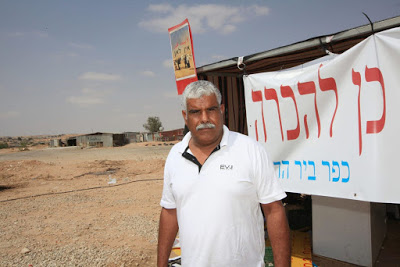 |
| Salim al-Dantiri in Bir Hadaj. He too has lost his citizenship due to what Israel claims is a registration error. July 2017 Eliyahu Hershkovitz |
for 13 years to obtain his citizenship, even though his late father served in
the IDF. He started the process in 2002, when he applied for a passport and the
Interior Ministry refused to give him one. “They said that my parents had
become citizens but weren’t ones to begin with,” he says. He finally obtained
Israeli citizenship in 2015. “I insisted on my rights and waged a campaign
against the bureaucracy by myself until I obtained citizenship, but I know
there are some people who give up,” he says. Saghaira’s father was a tracker in
the army for several years, and left after sustaining an injury. At the time,
he had seven children (including Attala), but three of them still are still
stateless.
Hovav industrial zone. He says that all five of his children and three of his
brothers received their Israeli citizenship but he has been refused each time
he requested to have it reinstated. “We’ve been living here for dozens of
years. My parents registered in the ‘50s and now I’ve been deprived of my
citizenship. Even if there was some mistake in the registration process I don’t
know why I have to pay for it,” he says. “Why are we to blame for things that
happened decades ago?”
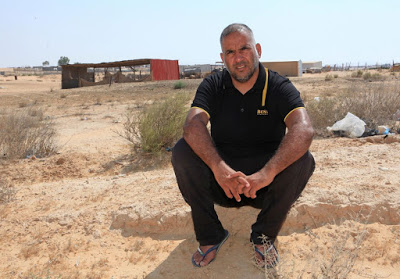 |
| Abu Garud Salame from the village of Bir Hadaj also had is citizenship revoked Eliyahu Hershkovitz |
in recent months from people who have been stripped of their Israeli
citizenship. Attorney Sausan Zahar from the Adalah Legal Center for Arab
Minority Rights in Israel recently appealed to Interior Minister Arye Dery and
to Attorney General Avichai Mendelblit, asking them to cancel this policy.
been going on at least since 2010. When Bedouin citizens come to Interior
Ministry offices in Be’er Sheva to take care of routine matters such as
changing their address, obtaining a birth certificate or registering names, the
Population Authority examines their status, as well as that of their parents
and grandparents, going back to the early days of the state.
been granted in error. On the spot, he changes their status from citizen to
resident and issues them a new document. People who lose their citizenship are
given no explanation and no opportunity to appeal. Instead, the clerk suggests
that they submit a request and start the process of obtaining citizenship from
scratch, as if they were newcomers to Israel.
do. Some submit a request for citizenship while others simply give up in
despair. Zahar says that many requests are denied due to missing documents, a
criminal record (not a valid reason for denying citizenship) or even the
applicant’s inability to speak Hebrew. Many Bedouin women who have been
stripped of citizenship fall into the latter category. One such woman filed an
appeal over the cancellation of her citizenship due to an alleged error. When
it turned out that her Hebrew was lacking, her appeal was rejected. She remains
stateless.
have been citizens for 20, 30 or even 40 years, some of whom served in the
army, who voted and paid their taxes, had clerks cancel their status with a
keystroke. As permanent residents, they can vote in local elections but cannot
run for office, vote in national elections or run for the Knesset. They receive
social benefits such as medical insurance and national insurance payments, but
cannot receive Israeli passports. If they are out of the country for prolonged
periods of time, they can also lose their permanent residency, and unlike
citizens, they cannot automatically transfer their status to their children.
Israel to parents who are Israeli citizens. There are families in which one
child is a citizen while another is a permanent resident. Some of those
affected were stripped of their citizenship when they tried to renew their
passports to go on the pilgrimage to Mecca, a mandatory tenet of Islam and
something they now cannot do.
British Mandate
the issue last year, following an accumulation of requests to reinstate
citizenship. During it, Interior Ministry officials confirmed that such a
policy exists: When Bedouin citizens come to the ministry’s offices, clerks
check the population registry for records of their parents and grandparents
between 1948 and 1952.
the state in 1948 and the passage of the Citizenship Law in 1952, many Arabs
could not register with the population authority since their communities were
governed by a military administration. This included areas in the Negev which
had a high concentration of Bedouin residents after 1948. In many cases,
checking the records of an individual’s grandparents entails looking at their
citizenship during the British Mandate – a time when Israeli citizenship did
not even exist.
check the extent of the phenomenon and its legality and to then update the
Interior Committee. The head of the ministry’s citizenship department, Ronen
Yerushalmi, submitted the findings to the committee’s chairman, David Amsalem
(Likud), in September 2016. Entitled “Erroneous Registration of Negev
Residents,” the report said that “the extent of the problem could involve up to
2,600 people with Israeli citizenship, who could lose it due to erroneous
registration by the Interior Ministry.” It added that since individual cases
had not been examined, the data was not precise and the numbers could even be
higher.
committee’s legal counsel, Gilad Keren, expressed doubts regarding the legality
of this process: “The citizenship law refers to cases in which citizenship was
obtained based on false details, namely under more serious circumstances, not
when the state has made a mistake. It refers to people giving false information
before obtaining their citizenship. The law allows the interior minister to
revoke citizenship only if less than three years have passed since it was
granted. After that a court needs to intervene in order to revoke it. I
therefore don’t understand how, when a person has been a citizen for 20 years
and the state makes a mistake, that person’s status is changed.”
demands an immediate halt to the citizenship cancellation policy. Zahar argued
that the people affected by it don’t even have the right to a hearing before
their Israeli citizenship is taken away from them. In addition to infringing on
their right to citizenship, she wrote, the policy blatantly infringes on their
right to equality. It is discriminatory based on nationality, since no Jewish
citizen has had his citizenship revoked due to a mistake in his parents’ or
grandparents’ registration under the Law of Return.
exposed is only the tip of the iceberg and what hasn’t been revealed yet is
even more serious,” says Touma-Suliman. She says that if Dery and Mendelblit do
not resolve the issue soon, it will go to the High Court of Justice. “There is
no justification for this policy,” she says. “The ministry is blatantly
violating the law. It’s unacceptable that in one family living under one roof,
half the children are citizens while the other half are residents or people
with indeterminate status.”
Ministry and the Population Authority, including the agency’s head until 2010,
Yaakov Ganot, and Amnon Ben-Ami, its director until recently. Former Interior
Minister Eli Ben-Yishai, who held the post most recently in 2013, said that if
a decision had been made to revoke the citizenship of Negev Bedouin, “I don’t
know about it and don’t remember holding discussions regarding this issue
during my tenure.”
were not instances of revoked citizenship but ones of past registration
mistakes, in which people had been registered as citizens but were not. It said
now was the time to fix the problem, adding that the ministry held a discussion
on the issue, the minister had taken a decision and the Knesset’s Interior
Committee had been informed. It said that “attempts are being made to address
this problem legally in a manner that won’t affect these individuals’ status in
Israel.” The Population Authority also said the attorney general would be
handling the appeal filed by Adalah.
citizenship being revoked but were instead situations of arranging legal
status. “The minister has directed officials at the Population and Immigration
Authority to handle the process involving this group of people in the easiest
and simplest way possible. Minister Dery asked them to find any way possible to
shorten the procedure in an attempt to avoid imposing any hardship on them,”
said the office.
is conducting an examination of thousands of people who have been erroneously
registered as citizens instead of permanent residents. Those who are found to
have been registered as such by mistake will be allowed to obtain citizenship
through an accelerated process, should they meet the legal criteria, the
response said.
According to the response, no one has been denied citizenship so far,
and residents’ rights are being maintained. Therefore the attorney general sees
no reason to intervene in the Population Authority’s decision, the response
said.
